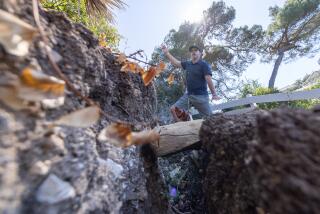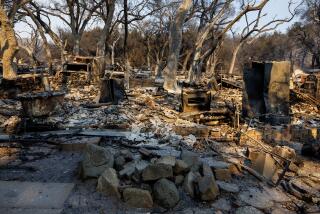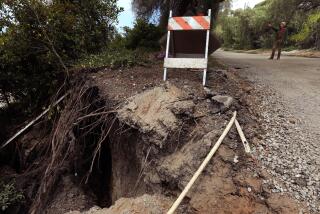Jury to Decide Size of Damage Award in Landslide Trial
The damage phase of the Flying Triangle landslide trial opened Wednesday, but the marathon trial--which once involved the owners or former owners of 22 properties and three defendants blamed for starting the slide--has dwindled to one couple doing battle with a local water company.
Five weeks ago, a Torrance Superior Court jury unanimously found that actions by the Rolling Hills Community Assn. and California Water Service Co. were partly responsible for the slow-moving slide, which has destroyed or damaged up to 30 luxury homes. Since then, all of the owners have reached settlements with the association, which maintains roads and other common areas in the affluent, gated city of Rolling Hills.
And all of them have settled with the water company, except Ranchero Road residents Larry and Corinne David. The same jury that heard the liability portion of the case will now decide how much money the Davids should get.
The trial--longest in the Torrance court’s history--took a year and involved about 800 exhibits and numerous expert witnesses. Judge J. Gary Hastings estimated Wednesday that the David trial will take three to five days. (Hastings inherited the case from Judge Frank Baffa when Baffa became presiding judge of the court last month.)
Terms of the other residents’ settlements were not disclosed. Judge George R. Perkovich Jr., who handles most settlement work for the court, has placed a gag order on discussing them until the jury has been dismissed.
He said they then will become a “matter of public record, and I know no reason why they will not be disclosed.” The suit asked for $31 million.
‘It Was a Grind’
Perkovich said he attempted for 1 1/2 years to settle the case. “It was a grind,” the judge said. “They should have been settled sooner . . . but there were just too many people involved.”
During the trial, a reported $900,000 settlement was reached with a third defendant, Lockwood-Singh engineers, who investigated prospective home sites in the Flying Triangle area in the late 1960s and concluded that developments were safe. The jury assigned 50% of the liability to Lockwood-Singh.
The jury found the water company and the association each 17.5% responsible for the slide as it affects 17 properties. For five other properties in a small area where the land movement first started, the liability was 25% and 10%, respectively.
The jury assigned 10% of the blame to Los Angeles County and 5% to the City of Rolling Hills because the two governments allowed homes to be built and, in the city’s case, controlled some drains. Both settled for a total of $4.4 million before the trial.
Rain Plea Rejected
Jurors rejected arguments by defendants that excessive rainfall in the late 1970s saturated the ground and restarted an ancient landslide. Owners contended that the association used canyons in the Flying Triangle as a drainage system, eroding canyon walls that supported the land. They also asserted that numerous leaks in water lines--as well as a break in a water main--helped keep the land moving after the slide began.
In an opening statement Wednesday, Major Langer, attorney for the Davids, said their house was the most recent to be affected directly by the landslide, which began in 1980.
He said an appraiser has concluded that the slide has reduced the value of the 2.5-acre residence from $1.3 million to between $50,000 and $75,000, but water company attorney Charles Bennett in his opening statement asserted that the present value is closer to $250,000, according to a company appraiser. It would be worth just over $1 million if there were no slide, Bennett said.
Larry David, who is a dermatologist in Hermosa Beach, testified that his house was a “dream home” in a peaceful area with an ocean view when he and his wife bought it in 1976.
Like a ‘War Zone’
But with the progression of the slide, he said, the peaceful neighborhood became more like a “war zone” where street damage sometimes prevented him from reaching his house.
David, who joined in the suit expecting that the slide would eventually affect his house, said direct damage began two weeks before last Christmas, when a wall started to twist, the kitchen floor developed a ridge and cracks appeared in the fireplace.
“It’s a hell rather than a home now,” David said.
More to Read
Sign up for Essential California
The most important California stories and recommendations in your inbox every morning.
You may occasionally receive promotional content from the Los Angeles Times.










